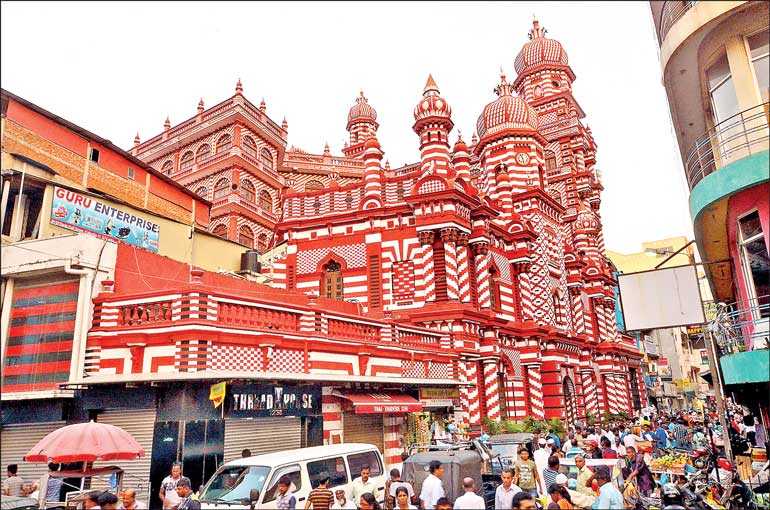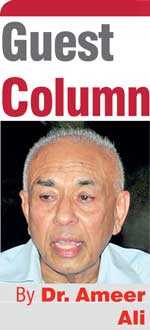Wednesday Feb 25, 2026
Wednesday Feb 25, 2026
Friday, 31 July 2020 00:10 - - {{hitsCtrl.values.hits}}

Historically, trade and religion had been the two principal agents that moulded the thinking and behaviour of Muslims – Pic by Shehan Gunasekara
The mosque and the market in Sri Lanka represent two principal agents of change influencing Muslim political thought and action.
By saying this, what is meant is not that these two institutions act as platforms for any particular brand  of political ideology or campaign, but that the type of religious indoctrination relayed through the pulpit and the rationale underpinning economic behaviour and attitude of Muslim traders and businessmen, a representative profession in Islam, have combined historically to nurture a mode of political thought which believes that the only way by which the Muslim community could survive and prosper in post-independent Sri Lanka is by joining the ruling party and Government.
of political ideology or campaign, but that the type of religious indoctrination relayed through the pulpit and the rationale underpinning economic behaviour and attitude of Muslim traders and businessmen, a representative profession in Islam, have combined historically to nurture a mode of political thought which believes that the only way by which the Muslim community could survive and prosper in post-independent Sri Lanka is by joining the ruling party and Government.
This was why from the time of political independence and introduction of party-based parliamentary democracy, a vast majority of Muslim candidates who contested elections did so either as members of the two dominant and winnable parties, UNP and SLFP, or as independents.
After winning their respective seats however, these independents, with one or two exceptions, joined the party in power. Although party-hopping is not entirely a Muslim phenomenon and has been a trademark of political opportunism in all communities, this practice among Muslims has a religious and economic rationale, which has escaped the attention of social scientists.
To start with, Muslims arrived in this country as traders, and Islam came along with them. Although it was the Arab traders who first introduced Islam into this country, it was the Indian Muslim traders who during the 16th century and after spread that faith vigorously, so much so that until the infiltration of Wahhabism in the 1980s, Islam in Sri Lanka was sealed with an Indian stamp.
It was not the so-called purified Saudi-Wahhabi variety, but the syncretic Indian type, influenced largely by Hinduism, that dominated Sri Lankan Muslim religious beliefs and practices. Thus, historically, trade and religion had been the two principal agents that moulded the thinking and behaviour of Muslims.
How does one relate this phenomenon to modern day political behaviour? To a trader, market size and stability is the chief determinant in profit-making. The larger the market size in terms of customer volume, and lower the turbulence or volatility, greater the opportunities for sales and profit.
In Sri Lanka, it is the majority Sinhalese and their spending habits that mainly determine market size. Even today, almost all successful retail trading outlets owned and operated by a handful of Muslim businessmen are located only in Sinhalese districts, towns and cities, a development that has given room for anti-Muslim propaganda and spread of Islamophobia among groups of Sinhala-Buddhist ethno-nationalist zealots.
However, from the point of view of the trader, everything in the trader’s arsenal of skills should be employed to keep Sinhalese customers happy, friendly, and satisfied. For example, the trader should be fluent in the language of the customers, be familiar with their customs and traditions, and be able to train and employ, wherever possible, as supporting staff in their shops members from the customers’ communities.
Besides, to maintain peace and stability in the market, the trader should also be supportive of dominant political trends found in the clientele community. One glaring example from Sri Lanka’s post-independent past should illustrate this mentality.
This was in relation to the Sinhala-Only Bill in 1957. In spite of the fact that Tamil is the mother tongue of more than 90% of Sri Lankan Muslims, two-thirds of whom live in the Northern and Eastern Tamil-dominant provinces, and that Muslim contribution to Tamil literature is amazingly sizeable, every Muslim political leader without exception supported that Bill.
Because, being essentially a “business community”, its economic survival depended on that support. Sinhala is the language of the majority of Muslim businesses’ clientele. The same argument may be lodged for the unanimous approval of Muslim politicians when Buddhism was given “foremost place” in the Republican Constitution of 1972.
No Muslim parliamentarian dared to object to that move, because once again Buddhism is the religion of the customers. The commercial adage “the customer is always right” is typical of Muslim thinking. In short, political pragmatism dictated by economic necessity compelled the community to support the actions of whichever party or faction that captured power. Even when the community created its own ethnic party, Sri Lanka Muslim Congress, it was only a vote-catching mechanism and a platform to bargain for special favours and coalesce with the party in power. Thus, Muslims had always been with the mainstream of politics.
This attitude of siding with the majority was reinforced by religious indoctrination. Throughout the history of Islam in this country, the most consistent message relayed by imams and religious preachers has been that human life is transient (no one disagrees with this) and that the reason why we are born in this world is to serve Allah and to prepare ourselves to attain paradise in the Hereafter. Serving Allah meant observing the religious obligations encoded by the Five Pillars of Islam. Taken together, these two messages, one constantly reminding about death and impermanency of life and the other promising heavenly rewards for those serving Allah, create a mindset that shuns or marginalizes serious involvement in mundane matters such as politics. Why should a mind impregnated with otherworldly commitment bother about politics, human rights, democracy, climate change, patriotism and so on? Why should a pious Muslim care about who governs this country and how? So long as a Government maintains peace and stability to earn a decent living and practice one’s religion, a Muslim would support that Government even if it turned out to be tyrannous. After all, imams in the past had already laid down a rule that tyranny was preferable to anarchy, and there are numerous sayings of the Prophet Muhammad and legal judgements that condemned social conflict and disorder, and which suggest that Islam encouraged unconditional obedience to a ruler.
With this background, it is worth reviewing the prevailing campaign by Muslim candidates who are appealing to their community voters to support Mahinda Rajapaksa’s SLPP on 5 August 2020. Although MR and his sibling, President GR, proclaim publicly that they have no prejudice against any community, and that they consider everyone a Sri Lankan, forces that are working behind the scene and campaigning at grassroots level, including some academics, members from the Sangha, certain media moguls and their team of journalists, are openly anti-Muslim and Islamophobic. Not only under MR’s second term of presidency, but also under the current GR’s presidency, Muslims have suffered immensely at the hands of ethno-nationalist Buddhist supremacists. True, the macabre act of April 2019 carried out by a bunch of Muslim lunatics provided these forces with a powerful propaganda weapon to spread hatred against Muslims. However, neither MR nor GR nor anyone from their team had taken any measures to restrain these forces. The situation does not seem to improve.
Yet, a group of Muslim politicians, realizing that SLPP has a good chance of capturing the Government, are contesting under its banner and advocating the idea that Muslims should be a partner in the coming regime. There is also no doubt that even those Muslims contesting under different banners and symbols, if they win, would eventually join the Government. The same mentality of joining the winning party continues to prevail despite the bitter experiences suffered by Muslims since 2013. The community seems to think that larger their number in the legislature, greater would be the chances of checking the anti-Muslim forces backing the SLPP. Once again wining special favours and privileges seems to dominate Muslim political strategy. Little do they realise that all that SLPP wants from Muslim parliamentarians is to lend support to its move to revise the Constitution and make the Presidency more dictatorial. It is a pity that Muslims refuse to consider this danger seriously, and are prepared to be hoodwinked by their own leaders.
Never in the history of post-independent Sri Lanka did Muslims back progressive forces in the country. Even when some progressives joined in a coalition with SLFP in 1970, Muslims, who benefited substantially in terms of education under that Government, eventually deserted the coalition and supported the UNP in 1977. Badi’s State-supported Islamic Socialist Front, which wanted to change the community’s mosque-market oriented political direction, proved no match to the mullah-merchant reactionary Anti-Marxist Front cobbled up by M. H. Mohamed. Thus, the political conservatism of this community and its readiness to join the winners after every election is the natural outcome of their unique history and religiosity. It is the mosque and the market that ultimately rule Muslim politics. If this is what meant by pragmatic politics then, in the context of the current wave of Sinhala-Buddhist ethno-nationalism, which is forcefully othering the minorities, it has outlived its use-by date.
In conclusion, of all the parties and candidates that are vying for power at the forthcoming election, only Anura Kumara Dissanayake’s JVP-led NPP has the most constructive ideas to save Sri Lanka from descending into a militarised state with economic misery, communal frictions, and compromised territorial sovereignty. NPP is not the old JVP driven by Sinhala chauvinism, and AKD is not campaigning on behalf of any ethnic group or class. Will Muslim voters wake up and vote for NPP, at least to strengthen its hands in the next legislature? If not, let them at least reject SLPP outright.